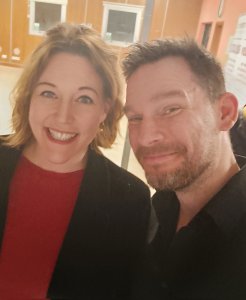Two by-elections are to be held in Brighton on 2nd May, the same day as the election for the Sussex Police and Crime Commissioner. The by-elections in Queen’s Park ward and Kemptown ward come following the resignations of Chandni Mistry and Bharti Gajjar, the so-called Leicester Two who were thrown out of the Labour Party following allegations that they don’t actually live in Brighton. A referral alleging electoral fraud was made to Sussex Police who have recently said no action will be taken over the claims.

Labour’s candidate in the Queen’s Park by-election, Camilla Gauge, with ward councillor Tristram Burden (Photo credit: Tristram Burden X / Twitter)
Council leader, Labour’s Bella Sankey, told the Argus that she was “overjoyed” by the decision of the two councillors to “do the right thing and step down” and said they should “never have been selected as candidates”. She said: “The people of Queen’s Park and Kemp Town can now elect new councillors that will listen to their needs and serve them properly.”
I’m not sure if “overjoyed” is the right word for it. This whole mess is the making of the Labour Party who really should be offering an apology for the unnecessary cost of two by-elections. A by-election, depending on the size of the ward, costs between £12,000 and £15,000. These by-elections, together with the one held in December in South Portslade, will bring the total to three by-elections caused by Labour since last May’s local elections, at a cost of between £36,000 and £45,000. What a waste of public money at a time when cuts are being made to essential service.
The apology should come from the national or regional Labour Party who took over the selection of candidates in Brighton and Hove. Perhaps the Labour Party should be offering both an apology and an offer to reimburse Brighton and Hove City Council for this unnecessary cost.
One person who should not apologise is Bella Sankey who was not the Leader of the Labour Group at the time of the selections and the election. She must be so frustrated by this and other decisions made by the regional Labour Party, such as not enabling someone with her qualities to be the Party’s candidate in Brighton Pavilion.
As for the by-elections themselves, Labour should hold on comfortably to both seats. In Camilla Gauge, who is standing in Queen’s Park ward, Labour has chosen an exceptional candidate who will bring experience and great ability to the Council, not least her expertise in tackling violence against women and girls. As far as I am aware, the Party is yet to select its candidate in Kemptown ward.
The Greens have traditionally had some success in Queen’s Park. How close they come to challenging Labour will provide an indication as to the mountain the party has yet to climb in recovering from its worst election defeat in 20 years in Brighton and Hove.
As for the Conservatives and Liberal Democrats, they have about as much chance of winning as a lame and blind donkey would have had winning the Gold Cup at the Cheltenham Festival this last week.
Update: 4.45pm 16/03/2024 Theresa Mackey has been selected as Labour’s candidate for the Kemptown by-election.






